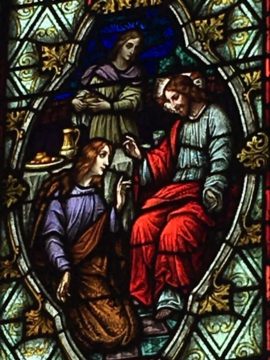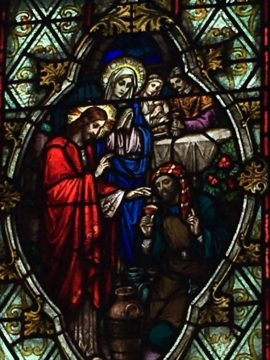On this Twenty-second Sunday in Ordinary Time, we offer a Franciscan Gospel reflection and questions written by Fr. Paul Gallagher, OFM for your prayer. They are edited by Franciscan Sister of Christian Charity Sister Anne Marie Lom and Joe Thiel. The excerpts from the Sunday readings are prepared by Joe Thiel. To read or download the complete pdf with excerpts for your prayer, please click here: Franciscan Gospel Reflection September 1 2019. Excerpts are from the Lectionary for Mass for Use in the Dioceses of the United States of America, second typical edition © 2001, 1998, 1997, 1986, 1970 Confraternity of Christian Doctrine, Inc., Washington, DC. Used with permission. All rights reserved. No portion of this text may be reproduced by any means without permission in writing from the copyright owner. Windows of Jesus at table with others: St. Thomas Catholic Community, Newton, Wisconsin
Luke 14:1, 7-14
On a Sabbath Jesus went to dine at the house of one of the leading Pharisees, and the people there were observing him closely.
He told a parable to those who had been invited, noticing how they were choosing the places of honor at the table: “When you are invited by someone to a wedding banquet, do not recline at table in the places of honor. A more distinguished guest than you may have been invited by him, and the host who invited both of you may approach you and say, ‘Give your place to this man,’ and then you would proceed with embarrassment to take the lowest place. “Rather, when you are invited, go and take the lowest place so that when the host comes to you he may say, ‘My friend, move up to a higher position.’ Then you will enjoy the esteem of your companions at the table. For everyone who exalts himself will be humbled, but the one who humbles himself will be exalted.”
Then he said to the host who invited him, “When you hold a lunch or a dinner, do not invite your friends or your brothers or your relatives or your wealthy neighbors, in case they may invite you back and you have repayment. Rather, when you hold a banquet, invite the poor, the crippled, the lame, the blind; blessed indeed will you be because of their inability to repay you. For you will be repaid at the resurrection of the righteous.”
Background:
In last week’s gospel, Jesus was asked how many would be saved. His response focused not on who would be saved; but on the quality of one’s relationship with God. The gospel concluded with Jesus stating that in the final realm of God, “Some are last who will be first, and some are first who will be last.” (Luke 13:30) You may also recall that someone in the crowd reminded Jesus that they had eaten and drank with him, using this as a way to claim that their relationship with Jesus entitled them to be counted among the elect. The importance of table fellowship in this culture is part of the cultural background for the gospel for this Sunday.
Immediately after last Sunday’s text, Luke describes how some Pharisees come to Jesus and urge him to leave the area, because Herod is seeking to kill him. Jesus mourns for the people of Jerusalem in a way that hints of his future rejection and death. Luke then returns to the Pharisees’ regard of Jesus, and he describes an occasion where a leading Pharisee has invited Jesus to a dinner at his house. That account is the gospel text for this Sunday.
The first line of the gospel sets the background for the unfolding of the rest of the text, and it is important for understanding the text. The Sabbath dinner was an opportunity to invite non-family members to dinner, and it was a time to engage in theological discussions. These meals were also a time to strengthen relationships among one’s equals. Jesus had been invited by a leader of the Pharisees, a group that believed in spirits and life after death. For Jesus to be carefully watched would not have been out of place.
At the time of Jesus, the Pharisees were a group of lay people who not only believed in life after death, but also centered their life on observing the sacred traditions. However, by the time the gospels were being written, the Pharisees had a more formal role in society as religious leaders. The fact that Jesus was being invited to the home of one of these leaders for a Sabbath meal would suggest that this man looked upon Jesus as an equal.
The first parable that Jesus tells reveals the concern that people of the day had for their status within the community. Protecting one’s honor and not being shamed was essential. Where each guest was seated in relation to the host revealed how important the host regarded that person. To be invited to move closer or further away was public recognition of one’s status. To be invited closer was public flattery, to be sent further away was public humiliation.
In the gospel, Jesus’ own behavior breaks with custom and would have been considered improper. The first parable criticizes the behavior of the guests who are seeking out the places of honor at the table, and it points to the absurdity of the practice of trying to achieve recognition of one’s status from the host. In doing so one may find themselves publicly humiliated for presuming one’s status.
The second short parable begins with verse 10. It is directed toward the host, the one who has invited those gathered. Again, Jesus is suggesting that a traditionally accepted practice not be followed. He suggests the host should abandon the practice of inviting people with the expectation that they will, in turn, invite him to their table. Rather, Jesus suggests, the host should invite those who have no hope of being able to return the gesture, those who could in fact do great harm to one’s reputation.
In both cases, Jesus does not suggest that the system of placing people in positions of honor be abolished, or that people not invite others to their table as way of gaining honor. What he does, rather, is reverse how people attempting to use these systems are to gain the esteem of their host and of others. Not said, but implied, is the suggestion that those who believe in eternal life ought to focus on one’s status before God.
Reflection Questions:
1. What role did dinner discussions/debate have in your development?
2. When you go to banquets, where do you like to sit? Why? Are there also places you avoid?
3. Are there people in your family who seem to be very concerned with etiquette, manners, and making a good impression on others?
4. What thoughts come to mind as you think of Jesus going to dinner with a leading Pharisee?
5. If you had been present at the gathering described in today’s gospel, what would have been some of the feelings going through you as this dinner unfolded?
6. Leaving this gathering, you would be saying to yourself…
7. When you think about other times in the gospel when Jesus was present for meals, you sense that Jesus…
8. How would you feel about inviting Jesus to your dinner table tonight?
9. Can you take some time to talk to God about how important your reputation in the community is to you, or about your awareness of how you were feeling as this text unfolded, or about some other thought that arose within you from this text?




